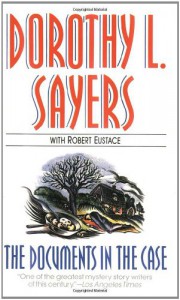2
Followers
2
Following
Stop Making Sense
I read anything that's nailed down, or even just moving slowly. Cereal boxes, candy wrappers, all genres, etc., and I don't always have much time for arbitrary distinctions like literary fiction vs. genre fiction.
The Documents in the Case
 My sister-in-law thought that I might get a kick out of this one, given that it's an epistolary murder mystery set in England that uses science. She was right on all counts.
My sister-in-law thought that I might get a kick out of this one, given that it's an epistolary murder mystery set in England that uses science. She was right on all counts.The epistolary format sometimes demands a little more from the reader, but it lends itself particularly well to this story. The novel opens with a man sending a series of documents to a nobleman and asking for his impressions of the "case." The reader is then led through the story based on letters, reports, and other documents reflecting multiple perspectives.
Readers will guess the identity of the murderer well before the end of the book, but the trick is in how it can be proved to the police. I won't spoil the method or how it comes to be used--suffice it to say it's both clever and accurate.
It had been a long time since I had read a good English mystery. Why is that, again?



